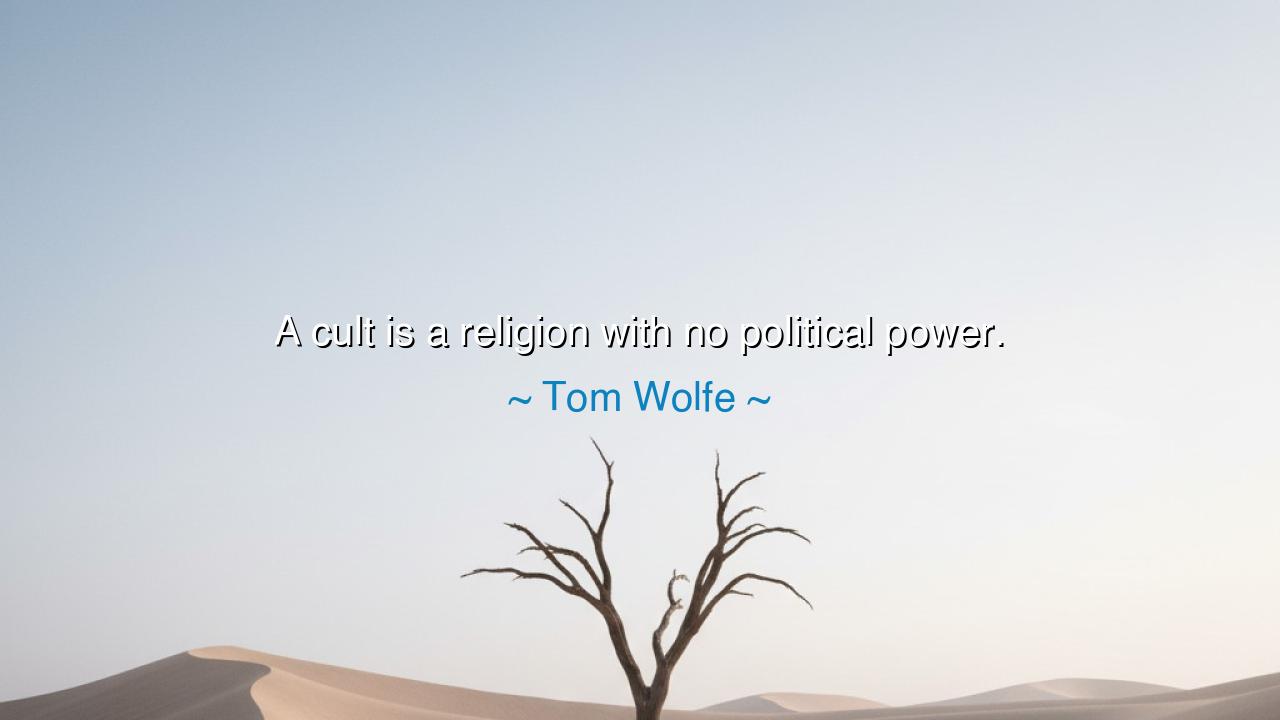
A cult is a religion with no political power.






Hear, O children of truth, the piercing words of Tom Wolfe, who declared: “A cult is a religion with no political power.” In this saying lies a revelation, a stripping away of illusion. For what men call cult and what men call religion are often divided not by doctrine or devotion, but by power itself. Once a faith is small, marginalized, or despised, it is branded a cult. But when its numbers swell, its leaders gain influence, and it seizes the instruments of society, it is suddenly exalted as religion. Thus Wolfe unmasks the fragile boundary between ridicule and reverence, between suspicion and sanctity.
The origin of this truth lies deep in the history of civilizations. The first Christians, huddled in catacombs, persecuted by Rome, were called a dangerous cult, a sect that threatened order. Yet in time, when Constantine raised the cross upon his banners, what had been reviled became the empire’s official faith, and with political power came legitimacy. The name of cult was stripped away, replaced by the authority of religion. Wolfe’s words remind us that the line between the two is not eternal, but political.
Consider too the story of Islam, born in the deserts of Arabia. When Muhammad first spoke of one God, his followers were mocked, hunted, driven into exile. To the powerful tribes of Mecca, they were but a troublesome cult. Yet when their numbers grew, when alliances were forged and cities conquered, what had been marginal became the foundation of one of the world’s great civilizations. Wolfe’s saying points to this pattern: that when belief joins hands with power, it sheds the name of cult and takes up the mantle of religion.
The meaning of Wolfe’s words is not merely historical, but deeply provocative. He reveals that society’s judgments of faith are often cloaked in the garments of power. Religion, in this view, is not always defined by its holiness but by its influence; cults are not inherently stranger or less sincere, but simply weaker. Thus the quote exposes human hypocrisy: that we label with reverence or scorn not by the purity of belief, but by its reach in the world.
Yet this saying also carries a warning. For when religion and political power intertwine too deeply, the flame of faith may be corrupted by the ambitions of rulers. The prophets who spoke of justice and humility may be silenced by priests who guard thrones and crowns. What was once pure may harden into institution, and what was once called a cult may rise again to challenge it, carrying the fire of renewal. Wolfe’s words remind us that history is a cycle: today’s cult may be tomorrow’s religion, and today’s religion may become tomorrow’s relic.
The lesson for us, O listeners, is to judge beliefs not by their power but by their fruit. Ask not, “Is this faith mighty?” but rather, “Does it bring compassion? Does it bring truth? Does it uplift the human soul?” Political power may make a religion respectable, but only love, justice, and integrity make it sacred. Do not despise the small or the weak, for they may hold treasures the world has yet to see. Do not glorify the powerful blindly, for strength alone does not sanctify.
Practical actions lie before you: Approach all traditions with humility, remembering that every great religion once walked as a small and fragile movement. Do not dismiss the minority voice as madness, nor accept the majority voice as truth merely because it is strong. Seek instead the essence of the teaching—does it heal, or does it wound? Does it free, or does it enslave? And in your own life, beware of equating respectability with righteousness.
Thus remember the teaching of Tom Wolfe: “A cult is a religion with no political power.” Do not be deceived by labels, for they are often written by victors, not by visionaries. What matters is not the size of the crowd nor the might of the institution, but the fire of the truth that burns within. For in the end, power fades, but the spirit endures, and the worth of any faith is measured not by its throne, but by its love.






AAdministratorAdministrator
Welcome, honored guests. Please leave a comment, we will respond soon